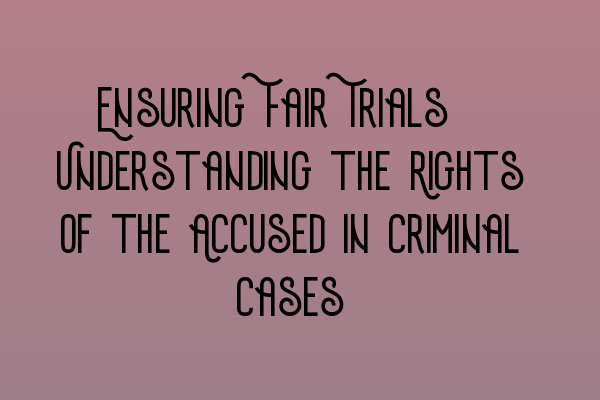Ensuring Fair Trials: Understanding the Rights of the Accused in Criminal Cases
When it comes to criminal cases, one of the fundamental principles of justice is ensuring fair trials for all individuals involved. The rights of the accused are crucial in upholding this principle, as they provide a safeguard against wrongful conviction and protect the dignity and integrity of each person involved in the legal process.
In this article, we will delve into the various rights of the accused in criminal cases, shedding light on their significance and how they contribute to the pursuit of justice. Let’s explore.
The Right to Legal Representation
One of the most fundamental rights of the accused is the right to legal representation. This means that every person accused of a crime has the right to be represented by a lawyer, regardless of whether they can afford one or not. Legal representation ensures that the accused can effectively present their case, understand the complexities of the legal system, and receive professional advice throughout the proceedings.
To prepare for their role as solicitors, aspiring legal professionals must undertake the SQE (Solicitors Qualifying Examination). If you are interested in learning more about essential study materials for the SQE exam, check out this article.
The Right to a Speedy Trial
Another crucial right guaranteed to the accused is the right to a speedy trial. This means that the legal process should be conducted without undue delay, allowing the accused to have their case resolved in a timely manner. A speedy trial not only protects the rights of the accused but also ensures that justice is served efficiently and effectively.
The Right to Presumption of Innocence
The presumption of innocence is a fundamental principle in criminal law, which states that an accused person is considered innocent until proven guilty beyond a reasonable doubt. This right protects individuals from being treated as guilty before a verdict is reached. It places the burden of proof on the prosecution to convince the court of the accused’s guilt.
If you are interested in learning more about the format of the Solicitors Qualifying Examination and how to navigate its challenges, check out this article.
The Right to Confront and Cross-Examine Witnesses
The accused has the right to confront and cross-examine witnesses presented by the prosecution. This right allows the accused to challenge the credibility and reliability of the evidence presented against them. It is crucial in ensuring a fair and transparent legal process.
The Right to Remain Silent
One of the most well-known rights of the accused is the right to remain silent. The right against self-incrimination ensures that an accused person cannot be compelled to testify or provide evidence against themselves. This right protects individuals from being forced to make statements that may incriminate them.
To effectively prepare for the SQE exam, international lawyers may face unique challenges. If you are interested in learning more about the challenges and success strategies for international lawyers taking the SQE exam, check out this article.
The Right to a Public Trial
The accused has the right to a public trial, where the proceedings are open to the general public and the media. This right ensures transparency in the legal process and allows for public scrutiny and accountability. However, certain circumstances may warrant exceptions to this right, such as cases involving national security or sensitive information.
The Right to Appeal
Finally, the accused has the right to appeal a conviction or sentence handed down by the court. The appellate process provides an opportunity for the accused to challenge the decision and seek a review based on legal errors or new evidence. This right acts as a safeguard against potential miscarriages of justice.
If you are an entrepreneur looking to set up an LLC in the UK, we have a step-by-step guide to simplify the process. Check out this article for a comprehensive guide on LLC formation.
Conclusion
Ensuring fair trials for the accused is crucial in upholding the principles of justice. The rights of the accused, such as the right to legal representation, a speedy trial, presumption of innocence, confrontation of witnesses, the right to remain silent, a public trial, and the right to appeal, all play a vital role in safeguarding the integrity of the legal process.
Understanding these rights is not only important for aspiring solicitors preparing for the SQE exam but for anyone interested in criminal law and justice. By upholding and respecting these rights, we can ensure that justice is served and the rights of all individuals are protected.
References
Demystifying the Solicitors Qualifying Examination Format
SQE Exam Prep: Essential Study Materials for Aspiring Solicitors
SQE Exam for International Lawyers: Challenges and Success Strategies
LLC Formation Made Simple: Step-by-Step Guide for UK Entrepreneurs
LLC Formation: A Step-by-Step Guide for UK Entrepreneurs
